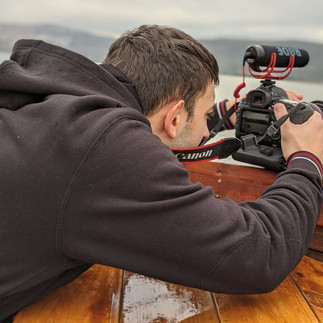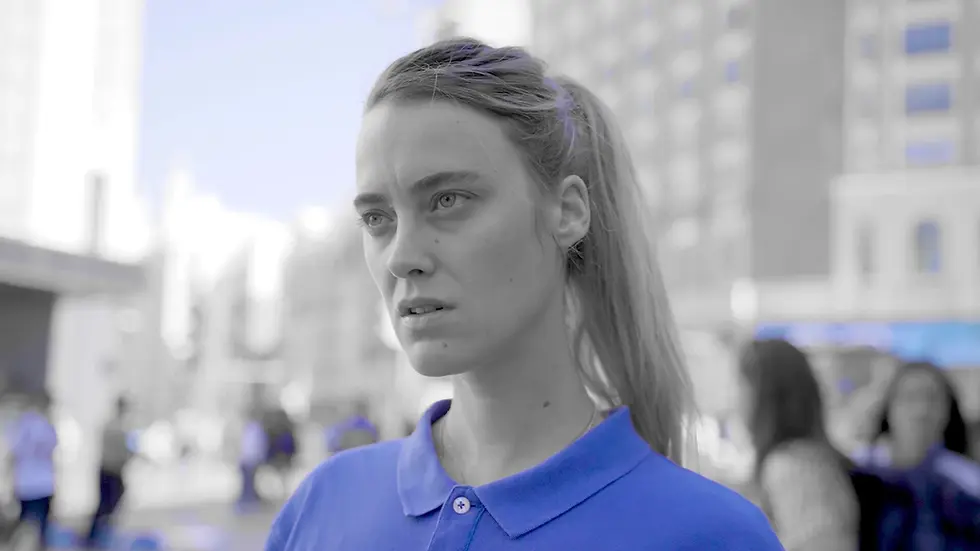An Interview with Greg Di Roma, Director of 'Our Triumphant Holy Day'
- Tokyo Cine Mag

- Feb 24, 2023
- 7 min read

1. Please tell us a little about yourself. How did you become interested in cinema? How did you learn it?
Growing up I always loved movies and different types of stories through different mediums, whether from TV shows, video games, books, comic books etc. When I was going to Westchester Community College one year, I started realizing I wanted to do something in the arts or communications. So I started taking digital arts classes like Digital Imaging, Video Editing, and Web Design. After I finished at WCC I transferred to SUNY Purchase and took a screenwriting class. Taking video editing and the screenwriting class at Purchase definitely piqued my interest in film. After my first semester at Purchase, I got a summer internship at this Digital Arts school called the Digital Arts Experience and we did a lot of production work which then helped me realize I wanted to go into film. After that summer I went back to Purchase, I was in the New Media program which covers just about every digital art you can think of However things weren’t working out there and I was becoming unhappy. They did have a film program at the school but when I looked into it, I had to wait a year to apply for the program. I of course didn’t want to wait that long especially with the uncertainty of getting into the program so at that time my sister was transferring to Pace University from Dutchess Community College so I decided to look into Pace to see if they had a film program and they did. I immediately applied to Pace and got in and jumped right into their Digital Cinema and Film-making program. I learned so much there and had amazing opportunities to work in production from working for the athletic department live streaming games and making a web series to taking a documentary class that brought us to Cuba to make a short documentary about the U.S. and Cuban relations being reestablished. The documentary is called Cuba’s Crossroads: Hope, Rock and Revolution which you can find on YouTube. That started my career as a documentary filmmaker.
2. Which one of your works is this film? And how did you come up with the original idea?
Our Triumphant Holy Day is my first feature documentary and directorial debut. This idea came about from my young adult ministry, Credo. The leaders at the time came up with the idea of going to the Holy Land in Israel and Palestine, so throughout the course of a year they planned out a pilgrimage to the Holy Land. My parish, St. Augustine’s in Ossining also joined the pilgrimage. Almost a year later I was approached by the chaplain who was running the pilgrimage and him and a few others had the idea of bringing me on the trip to document it. I jumped at the chance to not only helm a documentary but of course experience the Holy sites of Jesus and Salvation History.
3. What subjects do you think are less documented today? What subjects do documentary filmmakers not pursue?
I think individual stories of different people from all walks of life are documentaries we need to see more of. We’re starting to see more and more of them now especially with the tools we have now and the many different platforms we can show our work.
4. Please tell us a bit about the narrative line of your documentary film. Your feature documentary film has a rich visual variety. How did you reach the current narrative line from these images?
So the narrative is about my personal journey to the Holy Land along with my friends and the sites by themselves already tell a story since they are where literally Salvation History took place. Some of actual images of the event that took place there like the Grotto in Nazareth where the Annunciation happened, there’s an icon of it there or of course in the Church of Holy Sepulcher where the last moments of Jesus’ life took place and His Resurrection. The Chapel of Calvary has a lot of mosaics and images that show what happened in those spots like at the right side you see a mosaic of Jesus being nailed to the Cross then of course there’s a Crucifix at the exact spot where the Cross stood and Jesus died. So we’re telling the story through these images and landscapes and at Mass when the Gospel is read. Each has a different theme.
5. How much of this film was improvised and how much was planned? How do you see the role of editing in its creation?
A lot was improvised, Cinema Verite is all about improvising. The story sort of writes itself and it makes everything interesting. The interviews are of course planned out but you don’t know what the subject is going to say or talk about so as far as editing goes, that too can be a lot of improvising. I had an idea of what I wanted to make the story about and each event that happened helped make the story. It was just a matter of specifics, at first I was going to make the story about just the trip itself and everyone’s experiences but after doing a couple of rough cuts, my team and I realized we need to narrow things down. Just having a general story was not interesting enough, this trip converted me in a way I never thought possible. This trip made me much more serious about my Catholic Faith and gave me an entirely different perspective on life itself. That alone was a story and that’s what made this documentary.
Editing a story like this can be tedious, I had 22 hours of footage which for most filmmakers isn’t a lot but for me I never edited more than maybe 4 or 5 hours of footage so this was definitely a challenge. My first cut with dialogue was 4 hours! At that point I really didn’t know how I was going to trim it down. But with a series of trial and error and thinking back at films I’ve seen or how we edited the Cuba documentary gave me guidance on efficiently telling the story and of course guidance by the Holy Spirit.
6. Apart from yourself, two other cameramen have also collaborated in this film. Tell us about the way you worked.
Fabricio was our tour guide and filmed some things, he was so helpful in guiding me on what to film but also kept me from going where filming was restricted. His explanations really gave me a flow on what to film and how to go about it. Having Matt as a secondary cameraman was really helpful especially in Nazareth when we were filming the priests and the Franciscans doing the Angelus in the Grotto. It gave me more creative freedom in what angles to show and make efficient dialogue so I wouldn’t have to use a whole person’s sermon or leading in prayer.
7. Which documentary filmmakers have influenced you more than others?
Mark Bone is one that comes to mind, I’ve taken some of his Art of Documentary course and seen some of his films and he’s really good with Cinema Verite. His work isn’t just improvising, he has a unique way of telling his stories like for instance he had a client that was a supplement company and the way he promoted the product was to document this MMA fighter who is also a rescue worker. It’s called, “Kill or Be Killed,” it shows the many ways of making a documentary.

8. Do you reckon that even with brilliant ideas, financial constraints can be a significant factor in the failure of documentary filmmakers?
I think it depends on what kind of documentary or story you’re producing. If you want something top notch and want to use all the best cameras in the world and want shoot something in 4K or 8K and so fourth, it can cost a lot but again you don’t necessarily need all the latest gear to tell a story. It’s not about what camera or rig you’re using, it’s about the person behind the camera and their story that matters. Of course you want to have footage that is decent quality, I would say don’t shoot in a resolution lower than 1080p. But we’ve had some of the best films shot on iphones or other cell phones. Many of my projects have had footage from phones and they look amazing including Our Triumphant Holy Day.
9. Have there ever been ideas you regret not making?
Luckily no, I have a bunch of ideas for stories I want to tell. What stories I’ll be able to produce only time will tell and God knows what’s in store.
10. Do you think that various types of media and social networks have made the work of documentary filmmakers and independent filmmakers easier?
Absolutely, with more platforms and also more of the basic tools at our fingertips it’s definitely much easier to make a movie or videos and artists of any type can get their work out there much faster. This is called the New Media, we have many more outlets to get our work out there, we don’t have to rely on traditional mainstream media or Hollywood to make a name for ourselves.
11. How do you see the role of film festivals in the visibility of a documentary film?
If the past year has taught me anything, film festivals are so valuable. You want as many people as possible to see your film and just having a few local screenings or just having it available online is definitely not enough. You want to at least have a few veterans of the industry see it not only to get your name out there but to get feedback on your film. As big as our world is, this industry and other creative industries are a small world. Lots of people know each other and word travels fast.
12. If possible, please tell us about your next project.
Sure, a few months ago I was actually at your homeland on another Catholic Pilgrimage. This is sort of a sequel to Our Triumphant Holy Day but this time this documentary isn’t just going to be about the trip to Italy alone, it’s going to highlight a common theme from the Catholic sites in Italy, Discipleship. On the trip we learned about how the Apostles and the Saints after them evangelized and did their works for the faith. Here at home, I’m the President of my young adult ministry, Credo and we’re connected to a whole network of young adult groups around the Tri-State area of New York, New Jersey and Connecticut. Are mission is to do exactly what the Disciples did that is to evangelize, do works of charity and bring people together.
So this documentary is going connect the stories of Italy to our activities in young adult ministry and highlight discipleship of Christ back home. I’ve just added a couple of new crew members and will be adding a few more. Filming is currently far from wrapped as we got a bunch more activities planned and many more things to see. It’s going to be very interesting to see what we come up with.













Comments